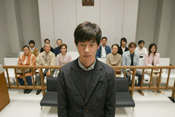On an unassuming morning, a preoccupied young man, Teppei Kaneko (Ryo Kase) irregularly boards an overcrowded train (with the assistance of the station’s white gloved, attendant shover) with his briefcase in hand on his way to a job interview and, while in transit, realizes that his jacket had been caught between the closing doors. Pinned to the doors of the train, Teppei instinctively continues to pull his jacket free, much to the irritation of the other passengers, until the train arrives at the station and releases him. On the surface, what appeared to be little more than a minor inconvenience in his morning commute would prove to be the beginning of a Kafkaesque nightmare when a schoolgirl grabs his sleeve at the platform and publicly accuses him of having groped her inside the train. Interrogated by police officers who immediately advise him to put the matter behind him by accepting the charge (on an apparently common occurrence) and paying a token, punitive fine (an advice subsequently echoed by his unmotivated public defender), Teppei instead refuses to be railroaded into a plea bargain and becomes more determined to prove his innocence in court. Caught in the judicial hypocrisy of having to remain in jail until the trial is underway because of his proclaimed innocence (even as other admitted offenders, having paid their customary fines, are immediately allowed to return home), the naïve Teppei enlists the aid of his mother (Masako Motai), best friend, Tatsuo (Koji Yamamoto, an idealistic defense attorney, Arakawa (Koji Yakusho), and his more skeptical junior colleague, Riko Sudo (Asaka Seto) to accept his long-shot case in the idealistic belief that innocence can triumph over the weight of judicial expediency. Masayuki Suo’s I Just Didn’t Do It is a taut, painstakingly observed, and incisive procedural on the intricacies of Japan’s highly efficient, juryless, one judge criminal justice system. During the Q&A, Suo remarked that the story had been loosely inspired by newspaper headlines of an appellate court’s reversal of a conviction handed down by a lower court. For Suo, the media’s particular attention in broadcasting such rare acquittals reinforces a public misconception and fosters complacency towards the dispensation and fairness of the justice system. At the heart of his sobering social realist drama is the country’s boasted 99.9% conviction rate, a daunting statistic that implicitly assumes a defendant’s guilt, despite the founding tenets of blind justice. Framed against Japanese society’s inherent cultural conformity, the statistic itself has become a symptom of perverted justice – an egregiously exploited tool for inducing confession, rather than a resulting measure of the system’s infallibility.
© Acquarello 2007. All rights reserved.
